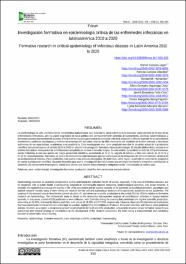Mostrar el registro sencillo del ítem
Investigación formativa en epidemiología crítica de las enfermedes infecciosas en latinoamérica 2010 a 2020
| dc.contributor.author | Campos-Ugaz, Osmer | |
| dc.contributor.author | Campos Olazábal, Patricia | |
| dc.contributor.author | Hernández, Ronald M. | |
| dc.contributor.author | Aguinaga Doig, Silvia Georgina | |
| dc.contributor.author | Falla Ortiz, Janeth Benedicta | |
| dc.contributor.author | Wong Fajardo, Emma Margarita | |
| dc.contributor.author | Morante Becerra, Lydia Mercedes | |
| dc.date.accessioned | 2023-10-18T15:27:51Z | |
| dc.date.available | 2023-10-18T15:27:51Z | |
| dc.date.issued | 2023-03 | |
| dc.identifier.uri | https://hdl.handle.net/20.500.13053/9569 | |
| dc.description.abstract | Epidemiology has been an essential interpretative tool to understand the collective health of society, especially in the case of infectious diseases, but its diagnostic role in public health is permanently subjected to diametrically opposed reasoning, epidemiological practices, and social demands. It provides the equipment to evaluate the quality of life of the population and its success depends on its economic and political providers, paradigms and applied research models, many of them merely the result of the free will and autonomous decisions of its specialists, academics or not academics. The purpose of this research was to describe the current situation of Latin American scientific production in the period 2010 to 2020 in relation to formative research on epidemiology. The bibliometric study is based on the descriptive-retrospective analysis of contributions collected in Scopus indexed journals. In this sense, a total of 120 publications were collected, with Colombia being the country that contributes the highest scientific production, amounting to 23.33%, followed by Mexico and Peru with values of 18.33% and 17.50%, respectively. Likewise, there are 83 international institutions that have participated in the production of the topic in question, highlighting the institutions of Mexico, Peru and Colombia, with four or more published articles. In short, as a region, a progressive growth is perceived in terms of scientific production, a favorable situation to use formative research as a transversal and integral strategy in contribution to the development of the research component, the latter being a transcendental and mandatory function in universities. of our country. | es_PE |
| dc.format | application/pdf | es_PE |
| dc.language.iso | spa | es_PE |
| dc.publisher | VENEZUELA VEN | es_PE |
| dc.rights | info:eu-repo/semantics/openAccess | es_PE |
| dc.rights.uri | https://creativecommons.org/licenses/by/4.0/ | es_PE |
| dc.subject | Latin American scientific productionepidemiology, formative researchtransversality | es_PE |
| dc.title | Investigación formativa en epidemiología crítica de las enfermedes infecciosas en latinoamérica 2010 a 2020 | es_PE |
| dc.title.alternative | Formative research in critical epidemiology of infectious diseases in Latin America 2010 to 2020 | es_PE |
| dc.type | info:eu-repo/semantics/article | es_PE |
| dc.identifier.doi | 10.52808/bmsa.8e7.632.003 | |
| dc.type.version | info:eu-repo/semantics/publishedVersion | es_PE |
| dc.subject.ocde | 3.03.00 -- Ciencias de la salud | es_PE |
Ficheros en el ítem
Este ítem aparece en la(s) siguiente(s) colección(es)
-
SCOPUS [380]


